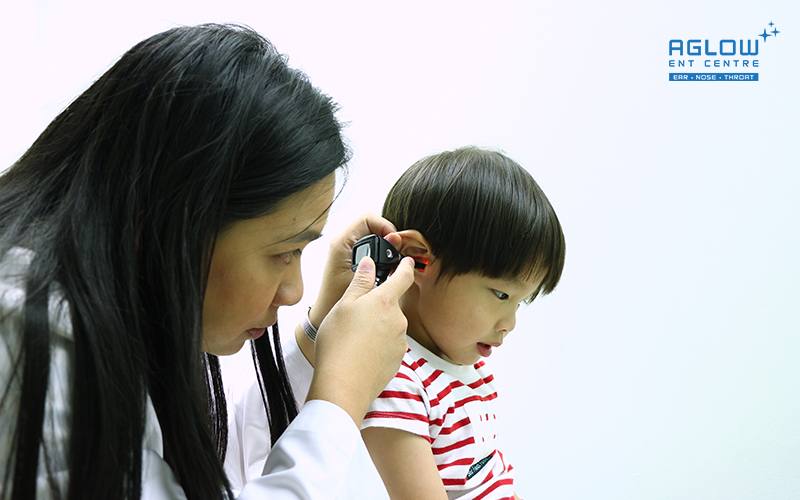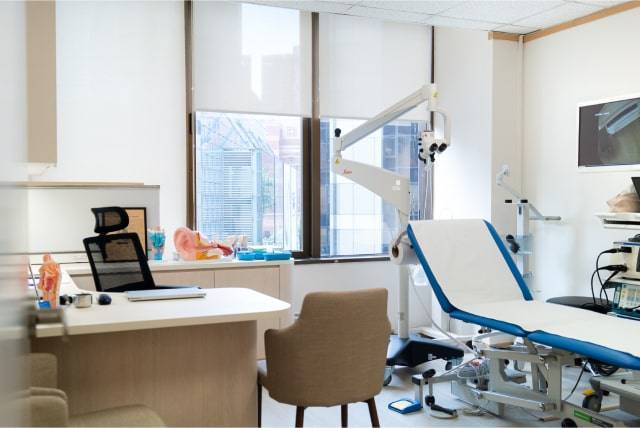Did you know that Laryngopharyngeal reflux (LPR), a type of acid reflux, is often known as silent reflux? This is because most people with this condition do not experience the common heartburn symptoms associated with traditional acid reflux. Instead, LPR usually presents symptoms that affect the throat and voice box, such as a persistent sore throat, chronic cough, hoarseness, and difficulty swallowing. As a result, the silent nature of LPR makes it more challenging for the condition to be diagnosed.
In Singapore, LPR is becoming more widely recognised due to rising concerns about diet, lifestyle factors, and environmental influences that can exacerbate reflux symptoms. An accurate diagnosis and appropriate treatment are crucial for managing LPR effectively, thus consulting an Ear, Nose and Throat (ENT) specialist in Singapore can be beneficial.
In this blog article, Dr Ker Liang, Aglow ENT Centre’s experienced ENT surgeon, leverages her subspeciality in Laryngology (a specialised branch of medicine focusing on throat, voice and swallowing disorders) to debunk common myths about LPR. She also introduces the available LPR treatments in Singapore to help patients manage their condition.
What Is Laryngopharyngeal Reflux (LPR)?
Normal anatomy
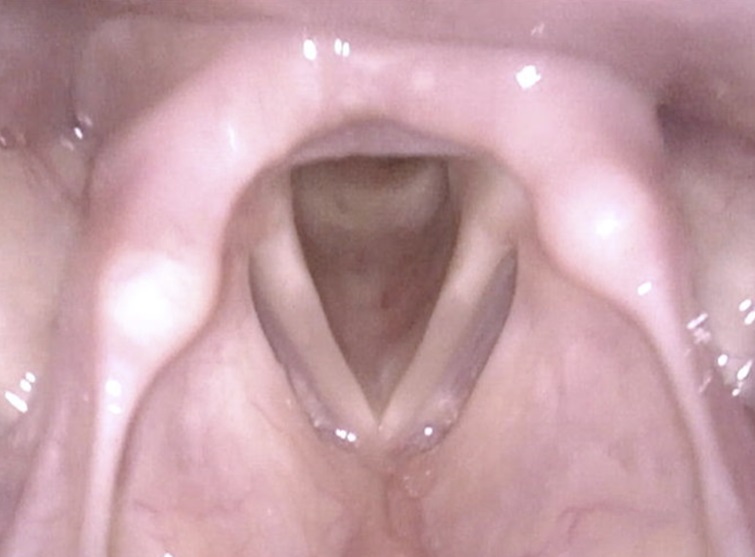
No swelling at the posterior commissure, specifically where the vocal cords meet.
Posterior commissure oedema
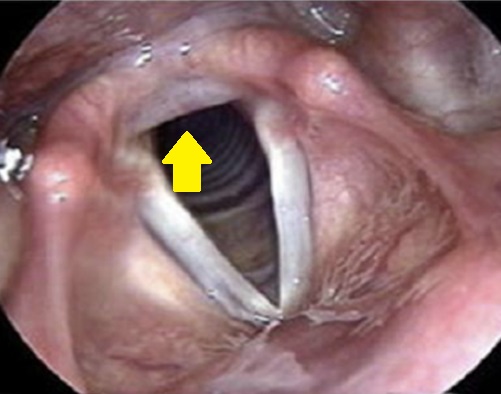
Swelling at the posterior commissure, close to where the vocal cords meet.
LPR is a condition where the contents of the stomach, including acid and enzymes, flow back up into the voice box (larynx), throat (pharynx), and nasal passages. One of the indicators of LPR is posterior commissure oedema. LPR is a throat reflux that occurs when the lower oesophageal sphincter (LES), which typically prevents stomach contents from moving upwards, malfunctions.
Key Symptoms of LPR:
Hoarseness Or Other Voice Changes:
- Notable alterations in voice quality, such as a weaker and huskier voice, especially noticeable upon waking or post-meal.
Chronic Coughing Up of Phlegm:
- The backflow of stomach acids into the larynx and pharynx can irritate these sensitive tissues, resulting in inflammation and phlegm production. This irritation often triggers a long-term cough that remains unresponsive to standard treatments.
Fluid in Throat When Lying Down:
- A frequent urge to clear the throat, often accompanied by a sensation of postnasal drip (excessive mucus in the throat) or the feeling of a lump (globus sensation).
Difficulty Swallowing:
- Experiencing a sensation as though food is lodged in the throat.
Sore Throat:
- Continuous throat discomfort without an underlying infection.
Breathing Difficulties:
- Episodes resembling asthma symptoms, such as wheezing.
Although these symptoms can indicate LPR, they can also be caused by other conditions such as allergies, viral infections, or environmental irritants. You can consult a throat specialist in Singapore for an accurate diagnosis and to rule out other conditions. A throat specialist can help determine whether your symptoms are due to LPR or another underlying condition.
What Are the Key Complications of Laryngopharyngeal Reflux (LPR)?
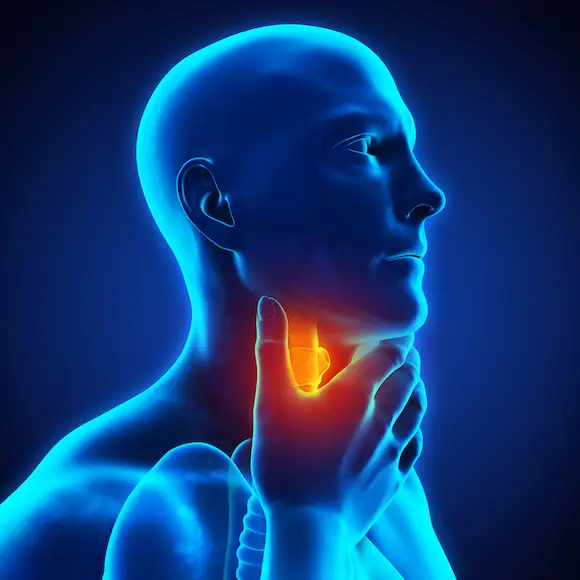
If left untreated, LPR can lead to various serious complications:
Laryngeal Granulomas:
- Inflammatory growths that can develop on the vocal cords due to chronic irritation from acid reflux.
Subglottic and Glottic Stenosis:
- Narrowing of the airway below or at the level of the vocal cords, potentially causing breathing difficulties.
Laryngospasm:
- A sudden closure of the vocal cords, leading to breathing difficulties, often triggered by acid irritation.
Chronic Laryngitis:
- Persistent inflammation of the larynx, resulting in ongoing hoarseness, voice changes and sore throat.
Recurrent Pneumonia:
- Aspiration of refluxed material into the lungs can lead to repeated lung infections.
Esophageal Strictures:
- Narrowing of the oesophagus due to scar tissue formation, causing swallowing difficulties.
Increased Risk of Laryngeal Cancer:
- Chronic exposure of the laryngeal tissues to stomach acid may increase the risk of developing cancer in this area.
Early intervention from a throat specialist in Singapore is crucial to mitigate these risks and maintain optimal throat and vocal health.
What Are Common Myths About Laryngopharyngeal Reflux (LPR)?
There are numerous myths surrounding LPR that can mislead people about the nature of the condition and its treatment. Let’s explore and debunk some of the most common misconceptions.
Myth 1: LPR Is Purely a Digestive Issue
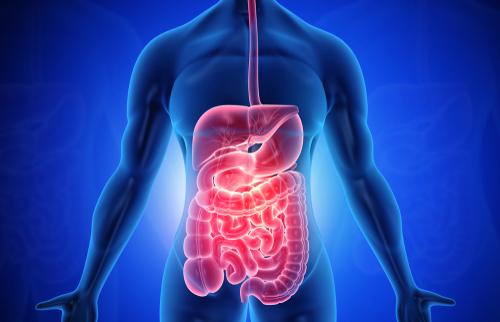
Many people assume that LPR is strictly a digestive issue, but this isn’t true. While LPR originates from the stomach, it can be influenced by external factors such as allergens, irritants, or respiratory conditions. For instance, post-nasal drip caused by allergies can irritate the throat and worsen reflux symptoms, particularly in individuals who are already predisposed to LPR. Moreover, environmental factors—such as exposure to cigarette smoke, air pollution, or other respiratory irritants—can exacerbate symptoms of LPR.
Due to the multi-faceted nature of LPR, managing Laryngopharyngeal Reflux (LPR) often involves collaboration between gastroenterologists and otolaryngologists (ENT specialists):
- Gastroenterologists focus on the gastrointestinal aspects of reflux, such as acid production and oesophagal function.
- Otolaryngologists address the upper airway symptoms and ENT complications associated with LPR.
Myth 2: LPR Is the Same as GERD
Laryngopharyngeal reflux
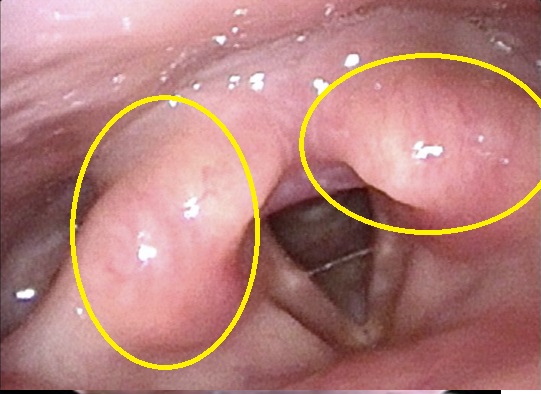
One of the indicators of LPR is arytenoid oedema (swelling of the arytenoid cartilages, which are structures in the voice box).
Gastroesophageal reflux disease
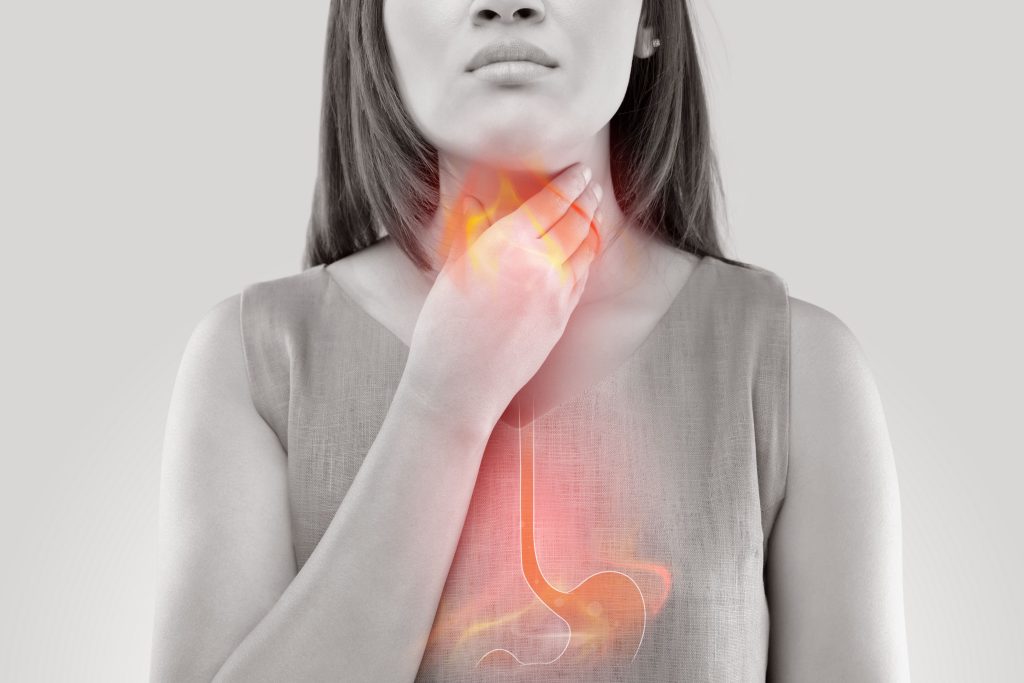
One of the indicators of GERD is a sensation of a lump in the throat.
Although laryngopharyngeal reflux (LPR) and Gastroesophageal reflux disease (GERD) both involve the backflow of stomach acid, they are not the same condition. LPR mainly concerns the throat, but GERD primarily affects the oesophagus.
One key difference between the two types of acid reflux is although heartburn (burning sensation in your chest or throat) is a hallmark symptom of GERD, it is uncommon in LPR cases.
By consulting a throat specialist in Singapore, individuals can differentiate between GERD and LPR and receive targeted treatment options for their specific condition.
Myth 3: All Patients With LPR Experience Hoarseness

Even though hoarseness is one of the key symptoms of LPR, not every patient will experience it. In fact, some patients with LPR may have other symptoms like chronic cough or excessive throat clearing without noticeable voice changes. As a result, patients may not immediately associate their symptoms with reflux, further delaying diagnosis and treatment.
If hoarseness or throat irritation persists for more than two weeks, it’s important to consult an ENT specialist, who will assess the situation and determine if LPR or another condition is responsible for the symptoms.
Myth 4: LPR Only Affects Older Adults
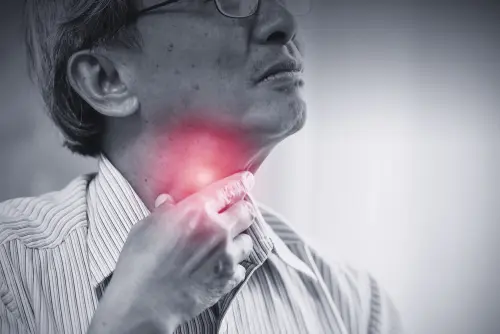
A common misconception is that LPR only affects older adults, but this is not the case. LPR can occur in people of all ages, including children and young adults. In fact, factors such as poor diet, stress, and sedentary lifestyles are contributing to the rise of LPR among younger individuals. Younger patients with LPR often experience symptoms such as chronic throat clearing, difficulty swallowing, and a sensation of fluid in the throat when lying down.
Myth 5: All Sore Throats Are Caused by LPR

Even though sore throats are one of the most common symptoms of LPR, they can also be caused by other conditions. Here are some common causes of sore throat besides LPR:
Allergies:
- Pollen: Inhalation of pollen can affect the nose, throat, and lungs, leading to throat pain, watery eyes, and sinus congestion.
- Dust Mites, Pet Dander, and Mold: Exposure to these allergens can cause throat irritation due to postnasal drip, where mucus from the nose and sinuses drains down the throat.
Environmental Factors:
- Dry Air: Breathing in dry air, especially during cold weather, can cause a sore throat, particularly in the morning.
- Air Pollution: Exposure to pollutants like ozone, nitrogen oxides, and fine dust can irritate the throat, leading to discomfort. Urban living and traffic fumes are frequently associated with a sore throat.
- Chemical Irritants: Exposure to chemical irritants can lead to throat irritation.
Vocal Strain:
- Overusing the vocal cords through yelling, singing loudly, or speaking for extended periods can lead to a sore throat.
Smoking and Alcohol Consumption:
- Smoking and drinking alcoholic beverages can irritate the throat lining, leading to soreness.
- They also cause relaxation of the sphincteric muscles of the stomach and esophagus, increasing the risk of laryngopharyngeal reflux
Myth 6: You Can’t Cure LPR

To date, there is no definitive cure for LPR, meaning that the condition cannot be completely eradicated, nor can it be guaranteed that it will not return. Nonetheless, doctors can significantly improve patients’ quality of life through a tailored treatment plan that addresses individual symptoms and lifestyle factors.
Myth 7: Surgery Is the Only Solution for LPR

Many people believe that surgery is the only way to manage LPR, but this is far from the truth. Surgery is typically reserved for extreme cases where all non-surgical options have not been effective.
Non-surgical treatments are the first-line approach for most LPR cases. In addition to medications, certain lifestyle changes can make a significant difference:
Avoiding Acidic Foods:
Spicy foods, citrus, and tomatoes can exacerbate reflux symptoms.
Eating Smaller Meals:
Larger meals increase the likelihood of acid reflux.
Elevating Your Head During Sleep:
This helps prevent acid from reaching the throat and voice box.
If surgery is required, Dr Ker Liang, an experienced ENT surgeon based in Mount Elizabeth Orchard Hospital’s Aglow ENT Centre, can provide you with a detailed recommendation of the benefits and risks.
Myth 8: Diet Has No Impact on LPR Symptoms

Diet plays an essential role in managing LPR symptoms. While some people may not realise the impact of their diet, certain foods can worsen or alleviate symptoms of acid reflux.
Foods that Can Exacerbate LPR Symptoms
Spicy Foods:
- Spicy foods, such as hot peppers, curry, and hot mustard, can irritate the throat lining, worsening LPR symptoms.
Fried and Fatty Foods:
- High-fat foods, including fried items and greasy meals, can relax the lower oesophagal sphincter, allowing acid to reflux more easily.
Citrus Fruits:
Fruits like oranges, lemons, and grapefruits are highly acidic and can irritate the oesophagus and throat.
Foods that Can Reduce LPR Symptoms
Alkaline foods:
- Alkaline foods, such as bananas, melons, and leafy greens, which can neutralise stomach acid.
Oatmeal and whole grains:
- Foods like steel-cut oats, rolled oats, brown rice, and quinoa help absorb excess stomach acid.
Lean proteins:
- Low-fat protein sources, such as chicken, turkey, and fish, can enhance the tonicity of the lower oesophagal sphincter, which is crucial for preventing acid reflux.
Incorporating these dietary adjustments can help reduce the frequency and severity of your LPR symptoms.
How Do I Know If My Laryngopharyngeal Reflux (LPR) Is Severe?
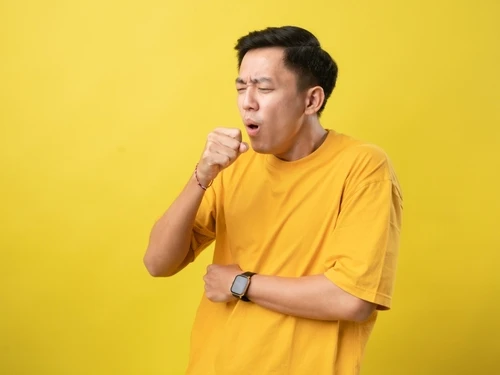
Symptoms of LPR that persist for more than 6 months despite medical treatment are considered severe and chronic. Common symptoms of severe LPR include:
Persistent Hoarseness:
- If your voice becomes consistently hoarse or raspy, despite avoiding known irritants or using voice-rest techniques, this could suggest that the reflux is significantly irritating your vocal cords.
- Difficulty Swallowing:
- If eating, drinking, or even swallowing saliva is painful to you, this could be a sign that the acid is causing inflammation in the throat and oesophagus.
- Chronic Coughing:
- If you find yourself coughing up phlegm regularly, especially after eating or lying down, this may be a sign that the reflux is irritating the airways and causing mucus production.
- Acid Reflux Coughing Up Phlegm:
- Continuous coughing, along with the sensation of having phlegm stuck in your throat, is often caused by the regurgitation of stomach acid into the airways, leading to inflammation and mucus production.
A visit to an ENT specialist is typically warranted for people with the symptoms above for an extended period. This is because specialised care is necessary to prevent long-term damage and improve the quality of life in such cases.
What Type of Doctor Should I See for Laryngopharyngeal Reflux (LPR)?

If you suspect you are suffering from LPR, consulting with a specialist who understands the complexities of throat reflux can be beneficial. LPR is indeed related to digestive issues. Nonetheless, it primarily affects the throat and voice box, making an ENT specialist an appropriate doctor for diagnosis and treatment.
You can consider scheduling an appointment with Aglow ENT Centre’s Medical Director, Dr Ker Liang, an ENT specialist based in Singapore’s Mount Elizabeth Hospital (Orchard). Dr Ker and her team are experts in the treatment of reflux-related throat issues, and they provide both diagnostic testing (like laryngoscopy) and treatment recommendations tailored to each patient’s specific needs.
What Are the Available Laryngopharyngeal Reflux (LPR) Treatments in Singapore?
Managing LPR requires a multifaceted approach that often involves lifestyle changes, medication, and, in severe cases, surgical intervention. Patients in Singapore can consider the following treatment options:
1. Lifestyle Modifications

An ENT specialist in Singapore can provide tailored lifestyle recommendations for the effective management of LPR. Some key modifications include:
Avoiding Trigger Foods:
- Foods like spicy dishes, citrus, chocolate, and caffeine can exacerbate reflux. Avoiding these can significantly reduce LPR symptoms.
Eating Smaller Meals:
- Large meals can increase stomach pressure and worsen reflux. Eating smaller, more frequent meals can help.
Not Eating Close to Bedtime:
- Late-night eating can relax the lower oesophagal sphincter, increasing the risk of acid reflux. Not eating 2 to 3 hours before bed helps maintain lower oesophagal sphincter tone, reducing reflux episodes.
Refraining from Lying Down After Eating:
- Staying upright for at least 2 to 3 hours after meals allows gravity to prevent stomach acid from flowing back up into the throat.
Elevating the Head of the Bed:
- Aim to raise the head of your bed by 6 to 8 inches. This elevation is generally effective in preventing reflux while maintaining sleep comfort.
Maintaining a Healthy Weight:
- Excess weight puts pressure on the abdomen, increasing the likelihood of reflux. Regular exercise and a balanced diet can alleviate LPR symptoms.
2. Medication

A combination of over-the-counter and prescription medication can mitigate symptoms of LPR. Here are some common types of over-the-counter LPR medication:
Antacids:
- Antacids can provide quick relief from LPR symptoms by neutralising stomach acid. They are useful for symptom management but do not address the underlying causes of reflux.
H2 blockers:
- H2 blockers reduce the production of stomach acid, providing longer-lasting relief than antacids. They can be taken before meals to prevent symptoms.
Proton Pump Inhibitors (PPIs):
- PPIs are stronger than H2 blockers and are often effective for long-term management of acid reflux symptoms like hoarseness, chronic cough, and sore throat. They reduce stomach acid production significantly and are often recommended for persistent symptoms.
If you suspect that you have LPR, it is essential for you to seek medical attention instead of relying on self-medication, as doctors can advise patients on the appropriate use of suitable over-the-counter medication and prescribe higher-strength medications.
3. Surgical Interventions
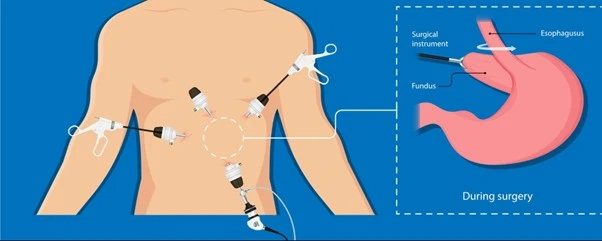
In severe cases of LPR that do not respond well to lifestyle modifications or medications, your ENT surgeon may advise you to consider undergoing surgery.
Surgical options for LPR
Conventional Fundoplication:
- Fundoplication involves wrapping the upper part of the stomach (fundus) around the lower oesophagal sphincter (LES) to strengthen it, thereby preventing acid reflux.
Transoral Incisionless Fundoplication:
- This endoscopic procedure is less invasive than the regular fundoplication procedure. The surgery reconstructs the valve between the oesophagus and stomach without external incisions. This approach aims to restore the natural barrier to reflux, reducing the potential for complications associated with traditional surgery.
Summary
Laryngopharyngeal Reflux (also called silent reflux) can be a debilitating condition, but it is manageable with the right approach. Debunking myths around LPR helps individuals understand throat reflux and take proactive steps toward improving their health. If you experience persistent symptoms (such as a sore throat, chronic cough, or throat reflux) for more than 6 months despite receiving treatment from a General Practitioner (GP), it’s time to consult with an experienced ENT specialist. ENT specialists can provide you with the expert care that you deserve, helping you to take charge of your condition.
Consult a Throat Specialist in Singapore

For effective LPR care tailored to your needs, book an appointment with Aglow ENT Centre, an ENT specialist clinic conveniently located in Singapore’s Mount Elizabeth Hospital (Orchard). By consulting Dr Ker Liang, who is Aglow ENT Centre’s Medical Director and ENT surgeon, you will receive specialised LPR care. As Dr Ker has undergone rigorous subspecialty training in Laryngology, she has deep expertise in LPR.

Dr Ker Liang has over 14 years of experience in the field of Otolaryngology. Dr Ker specialises in treating patients, including children and seniors, with general ENT conditions and has a particular interest in sinus surgery and Laryngology. She underwent fellowship training under Professor Marc Remacle and is well-versed in Laryngological conditions related to the throat, voice, and swallowing. Prior to setting up her own ENT clinic, Dr Ker treated numerous local and international patients, including military generals, in her Voice and Swallowing Clinic at NUH.
References
https://www.medicalnewstoday.com/articles/lpr-vs-gerd#contacting-a-doctor
https://my.clevelandclinic.org/health/diseases/15024-laryngopharyngeal-reflux-lpr





